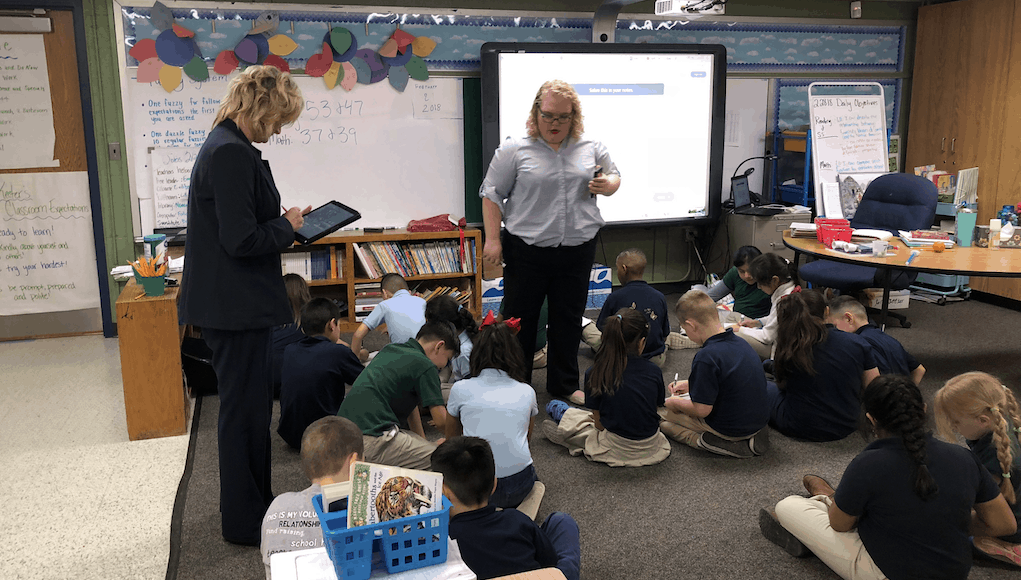Coaching Yields Better Formative Assessment in Tulsa

By Tom Vander Ark & Mary Ryerse
“I’ll take as many strategies as you can give me,” Alison Keeter told her coach. As one of 20 Tulsa Public School teachers to volunteer for the formative assessment project, Keeter receives coaching from Tamara Hall
In Keeter’s third grade classroom at Mitchell Elementary, Dr. Hall is scouting for overt evidence of student thinking: what are students are doing, saying, writing, or making?
“I want to see evidence of learning goals,” said Dr. Hall. “I want to see what students know.”
The formative assessment coaching helps teachers to shift their thinking from the teacher role to the student role within the classroom so that students become more involved in, and responsible for, learning.
A typical coaching cycle begins with pre-conference sessions where teachers share various aspects of their lessons, their goals and where they would like the coach to focus regarding specific feedback. Accordingly, Hall and Keeter huddle for 10 minutes to discuss a lesson plan. Keeter explains her plan for whole group math lesson on Zearn. She explained how the lesson will be sequenced and what interactions she plans.
Keeter launches the lesson with Hall keenly observing everything in the classroom. In addition to mastering the foundational formative assessment dimensions of setting learning goals, establishing criteria for success, eliciting evidence of student learning Alison has a long-term goal of improving student-to-student peer feedback among her students learning.
To that end, Hall is observing classroom interactions to help Keeter along the progression. Scribbling on an iPad in coaching shorthand, Hall is recording the number, type, and quality of student interactions.

The lesson includes some single student responses, some turn and talk, some stop and jot. Hall is pleased to observe 100% of the students were writing their responses on their whiteboards when the teacher asked a question, providing evidence of student learning.
Hall explains that the goal of her coaching is to help Keeter become more intentional and deliberate with eliciting evidence of student learning, then be more able to make instructional decisions based on that evidence.
Dr. Hall is a former principal in Dysart, a high performing Arizona district. As a School and District Improvement Facilitator for WestEd, she draws on the protocols and resources of a rich coaching practice.
Coaching concludes with a debrief. Hall recaps all of the observed student interactions and evidence of learning. “During my classroom visit with Alison, I gathered data around identified goal areas, which included eliciting overt evidence of student learning. Alison, has embraced the coaching process around the implementation of formative assessment practices within her classroom, of which will result in improved student learning.”
Recalling all the new strategies now incorporated into her repertoire, Keeter said, “I’m hands down a better teacher.” She expressed gratitude for the specific skill building she was receiving through the coaching, “It was like receiving a toolbox and Tammy was filling it up.”
Tammy Hall reflects, “During my classroom visit with Alison, I gathered data around identified goal areas, which included eliciting overt evidence of student learning. Alison, has embraced the coaching process around the implementation of formative assessment practices within her classroom, of which will result in improved student learning.”
Principal Bryan Gibson supports the formative assessment coaching and sees it well aligned with the goals of their weekly professional learning community meetings where teachers bring evidence of student learning.
How I Know in Tulsa
Under the leadership of Dr. Deborah Gist, Tulsa Public Schools (TPS) is the second largest school district in Oklahoma, serving over 42,000 students in 96 schools. TPS serves a highly diverse population of students – 72% FRL, 18% students with exceptional needs, 30% who speak a language other than English – that need to be engaged in learning in different ways.
TPS is part of a three-district collaborative project: How I Know: Designing Meaningful Formative Assessment Practice. #HowIKnow was created in an effort to improve and impact formative assessment for teachers and students in three pilot districts (Dallas Independent School District, Austin Independent School District, and Tulsa Public Schools).
“We wanted to create proof points, and build know-how and skill in the district,” said Gist about joining #HowIKnow.
Through the Michael & Susan Dell Foundation sponsored initiative, these districts will identify, scale and share successful approaches for designing formative assessment practice in classrooms. Their learning and strategies will be shared through the How I Know Website.
“Our goal is to build a student-centered community in which all students are learners, contributors and designers who grapple joyfully with complex ideas, texts and tasks that prepare them for the greatest success in college, career and life,” said TPS project coordinators Martin Greene and Erin Lester. “Effective, aligned assessment practices will help students, teachers, and leaders drive us to our goal.
Schools involved in the How I Know Initiative include: Anderson Elementary, Mitchell Elementary, Rogers College Junior-Senior High, and Zarrow Elementary.
Green and Lester bring the 20 teachers together between coaching visits for collective learning. They also coordinate the district’s grant from Assessment for Learning Project (ALP).
“We believe that our Students Can. We know that Teachers Make it Happen,” said Greene. “We have an exciting opportunity to support our teachers and leaders to design learning experiences that enable our students to deeply engage in their education and own their learning.”
Through How I Know and ALP, “we will partner with our teachers to learn alongside them as they craft and personalize life-changing formative assessment practices for their classrooms,” added Greene.
Tulsa’s Path Forward for Formative
One unique aspect of the initiative is that data regarding current practice is gathered prior to determining specific growth goals.
With the support of the WestEd coach, TPS identified the following three targeted areas for professional development: 1) Learning Goals 2) Criteria for Success and 3) Eliciting Evidence of Student Learning (which happen to align with the foundational goals).
In addition to the professional learning goals, TPS has identified the following goals for growth during the How I Know Initiative.
District Level Goals
- Comprehensive Assessment Approach Tied to Learning: We need to more clearly understand our assessment system (both formal and informal) and how to think about this as a comprehensive approach to inform and support student learning
- Shared Understanding of FA: Develop a shared understanding of FA, the FARROP rubric and how these practices support our Vision for Learning.
- Equip Principals to Support and Lead: Provide our principals with the tools to lead and support. They are the front line in supporting our teachers through coaching and reflective practices in order to lead to improved student outcomes
- Culture of Experimentation: We need to understand that it’s okay to experiment and fail forward. We expect that of our kids and likewise, we will allow our teachers the time and space needed to explore and experiment
Classroom Level Goals
- Professional development. As featured above, TPS is working with their WestEd coach to ensure teachers are focusing on the following formative areas: criteria for success, peer feedback and self-assessment. In addition to the F2F coaching support, teachers and school leaders are working on an online learning platform through a 4-week learning cycle.
- Structures to support growth and implementation. In addition to the PD, we plan to provide space for our teachers to collaborate on problems of practice in monthly PLCs, encourage their use of Canvas for collaboration, and provide guiding protocols for providing feedback on their progress.
Greene reflects, “We know that working alongside our teachers as learners, contributors, and designers to live out Assessment for Learning in all classrooms, we will help all TPS students evolve into 21st century learners who are prepared for the greatest success in college, careers, and life.”
For more on formative assessment, see:
- Scaling Formative Assessment: The How I Know Project
- What is Formative Assessment? Voices from Field
- The Student Role in Formative Assessment: How I Know Practitioner Guide
For more on Tulsa area schools and ImpactTulsa see:
- Expanding Access to Powerful Learning in Tulsa (podcast with Deborah Gist)
- Union High: How a Big School Makes Learning Personal
- Active Learning and Student Leadership (Jenks Intermediate)
This post is a part of a series focused on the “How I Know: Designing Meaningful Formative Assessment” initiative sponsored by the Michael & Susan Dell Foundation. See the How I Know website (www.formativeassessmentpractice.org) and join the conversation on Twitter using #HowIKnow or #Formative Assessment
Stay in-the-know with all things EdTech and innovations in learning by signing up to receive the weekly Smart Update. This post includes mentions of a Getting Smart partner. For a full list of partners, affiliate organizations and all other disclosures, please see our Partner page.






0 Comments
Leave a Comment
Your email address will not be published. All fields are required.